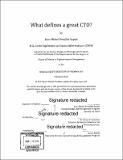What defines a great CTO?
Author(s)
Prouillet-Leplat, Jean-Michel.
Download1103605641-MIT.pdf (10.64Mb)
Alternative title
What defines a great chief technology officer?
Other Contributors
Massachusetts Institute of Technology. Engineering and Management Program.
System Design and Management Program.
Advisor
Bruce G. Cameron.
Terms of use
Metadata
Show full item recordAbstract
The pace of technology development shapes the landscape of almost every industry today. The words innovation, digital transformation, process automation are synonyms of success. The most successful corporations nowadays understand that technology should not be a standalone initiative gated within the IT department, to achieve an impact, technology must become a part of company's DNA along with its brand strategy or culture. The study examines the role of the CTO, which has been relatively poorly characterized by research to date. This research characterizes how CTOs view their job description, notably how they balance internally-focused attention with external responsibilities. This work draws on a quantitative analysis of 100 CTOs from Linkedln to understand their tenure duration and career history. We also collected primary data through interviews with 20 CTOs to understand their activities, responsibilities and the context that influences the span of impact. This work posits five Personas of CTOs: The Evangelist, the Anchor, the Coordinator, the Visionary, and the Strategist in various corporate settings. The study further examines the relationship between the career path of the CTO, his/her responsibilities and impacts in current role. The study indicates that the CTOs' responsibilities align most closely with the Coordinator and the Anchor personas. Both responsibilities and personas showed coherent distribution relative to the company maturity giving the opportunity to draw a CTOs' lifecycle where the Anchor is more likely to be found in early companies and the Coordinator in mature companies. Among the CTOs studied, 10% to 20% do not have a pure technical background, 40% are not involved in product delivery and only 36% had previously served as a CTO in another firm. The data also shows that CTOs would like to be highly collaborative and cross-functional, and desire proximity to the CEO.
Description
Thesis: S.M. in Engineering and Management, Massachusetts Institute of Technology, System Design and Management Program, 2019 Cataloged from PDF version of thesis. Includes bibliographical references (pages 73-74).
Date issued
2019Department
Massachusetts Institute of Technology. Engineering and Management ProgramPublisher
Massachusetts Institute of Technology
Keywords
Engineering and Management Program., System Design and Management Program.